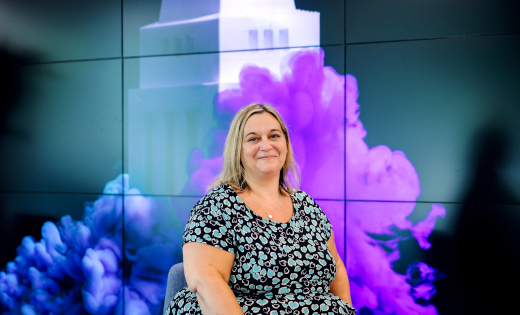Inside Track | Putting people at the heart of change
Jenny Baynes describes what transformation means in the context of our strategy, and why she’s committed to putting people first, making the process of change more meaningful for staff and students.

Jenny joined Leeds this year as our first Director of Transformation and heads up our recently formed Transformation Office.
Since I’ve joined the team at Leeds, I’ve found people have lots of questions about the Transformation Office. Mainly: “What is it?”
Fundamentally, the Transformation Office was established as a centre of excellence – a resource to give focus to, and enable effective delivery of, our large-scale transformation programmes, such as Curriculum Redefined, the Student Lifecycle Programme (SLP), Corporate Processes and Systems (CPS) and the Digital Engagement and Be Safe programmes (DEBS).
These programmes are key to the delivery of the University’s 10-year strategy: Universal Values, Global Change. To make our strategy meaningful, we need to engage all stakeholders in the most accessible, effective and impactful way through our academic programmes, and the way we work with colleagues, partners and the wider community.
The Transformation Office hasn’t just been set up to ensure these programmes succeed, but with three core functions – enterprise design, portfolio management and change delivery – we’re also here to provide resources and support to all those involved.
Our support kicks in at the very beginning, right through to the implementation of the changes and beyond. It encompasses service design, workflow management, governance and standards, assessing and measuring impact and helping ensure that the deliverables reflect the objectives. In essence, the Transformation Office is the front door for change at Leeds.
During the course of the past decade, universities have realised that, to make these huge transformation programmes really work, we need our people – students, staff and researchers – to understand why the change is happening and who it is happening to.
Organisational transformation is predominantly, though not exclusively, digital, so it’s easy to get lost in systems, processes and outputs, rather than outcomes for the people who are impacted by, and benefit from, the change.
So, in addition to the question “What do we want this programme to achieve?”, we will ask “How do we want people to experience this?” and “How will it change their lives for the better?”
Building from this starting point means that people – students, staff, researchers, local and global communities – are always top of mind.
Making change work for the University
In an organisation like the University of Leeds, large-scale individual change programmes are a constant. They are separate and distinct, but it’s important to realise they are interdependent.
Integrating discrete transformation programmes under an organisation-wide, cross-curricular and multi-departmental ‘umbrella’ means that we can see better how things fit together, when the best time is to act, and who has the capacity to help.
Our aim is that these programmes slot together like a jigsaw puzzle, each separate piece contributing to the overall vision. This cuts delivery time and saves money. We don’t need to reinvent the wheel if someone has already been there and made it work.
The Transformation Office helps ensure the programmes not only achieve their stated goals but are delivered effectively and successfully, and that the University Executive Group and Council can see that the benefits will be realised, financial management and resourcing is in place and everything is digitally integrated.
There are a lot of synergies between the transformation programmes currently underway. Essentially, they all focus on improving the staff and student experience; making data-based processes faster, more flexible and easier to use.
- Curriculum Redesigned is simplifying the curriculum, making it work better online and offline, helping reduce workloads and avoid timetable clashes that put a brake on teaching and learning.
- Corporate Processes and Systems aims to reduce and standardise the systems and processes we use, making them work together more effectively and enabling simpler planning and reporting.
- The Student Lifecycle Programme enhances and improves the student journey through the University, from applying for a place, sorting finance, onboarding, studying, graduating and beyond.
- Digital Enablement and BeSafe are IT transformation programmes designed to make it easier for people to work digitally in ways that are more effective for them and the University, and to strengthen our infrastructure and increase data security.
The result provides a more sustainable, intuitive and adaptable experience for our whole community – prospective students, current students, alumni, staff, researchers and partners.
Help, don’t hinder change
I’ve been involved with business transformation and change programmes for several years, in national and local government, public services and education. That’s taught me not only what works, but also what can hinder effective change.
Change is hard and can be frustrating, and one of the most effective things we can do in the Transformation Office is to shine a light and show people the way. We know many change programmes fail to deliver the expected benefits because we don’t embed them successfully in our policies. By making sure we are completely clear about the benefits of the change on everyone impacted, that governance is transparent, effective and well managed, and that all stakeholders are fully engaged, we can create an environment for change to be successful and drive real value.
Register for our online event
Interested in hearing more about the work of the Transformation Office?
Join us at an online event to learn how the Transformation Office is improving the experience of our University community. Taking place from 11am to 12 noon on Monday 12 December, you will hear from Jenny Baynes, together with our Chief Operating Officer, Rachel Brealey, and Professor Jo-Anne Murray, our newly appointed Pro Vice-Chancellor: Digital Transformation.
Transformation Office Programme Directors will also be on hand to share our progress to date and answer any questions you might have about change or transformational programmes at Leeds.
Posted in: University newsDigital Transformation